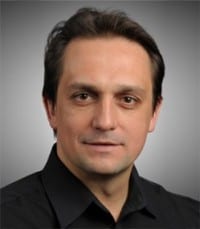Citizenship; A Natural Step for UCF Professor
When Dmitry Kolpas hchikov, an assistant professor of chemistry at UCF, came to the United States, he never expected that he would be among a group of 85 people from 34 countries to become naturalized.
hchikov, an assistant professor of chemistry at UCF, came to the United States, he never expected that he would be among a group of 85 people from 34 countries to become naturalized.
A ceremony was held by the U.S. Citizenship and Immigration Services on Sept. 19 to welcome the group and was part of its annual celebration of Constitution Day and Citizenship Day, according to a press release from USCIS.
Kolpashchikov described the ceremony as well organized and special and said that his emotions changed afterward.
“After the ceremony, I felt like I became finally a part of this country and I am responsible for what is happening now, and I didn’t feel that way before the ceremony,” Kolpashchikov said.
Born in Tyumen, Russia, Kolpashchikov, 41, immigrated to the United States in 2002.
His original plan was to stay in the United States between three and five years for professional training and then move back to Russia, but, he said, “my professional career was moving on in this country, so I decided to stay.”
Before moving to the United States, Kolpashchikov received training in Japan and France.
He said he was attracted to the United States because the country has many outstanding professionals and he wanted to learn from them.
He began postdoctoral training at Columbia University from 2002 to 2003, and then became professionally employed there as an associate research scientist until 2008, according to his curriculum vitae.
Citing a lack of space to do his research, Kolpashchikov sought a position that would allow him to work more efficiently.
He applied to many universities and, as a result, was offered a job from UCF.
“Once I arrived here, I received an opportunity to do research as I have never had before. I got my laboratory space, I got startup funds and in the second year we published a bunch of papers, as many as I’ve never published before in one year,” Kolpashchikov said.
During his five years at UCF, Kolpashchikov has attracted more than $1 million to his department and is internationally recognized in his field, according to a press release from USCIS.
Currently, he is working on three projects in the lab and on Sept. 27 published an article with UCF postdoctoral associate Yulia Gerasimova in the scientific journal Angewandte Chemie.
Across the way from Kolpashchikov’s office is a laboratory where his students help him work on his projects.
“Our projects are all about DNA research,” Kolpashchikov said. “It is the main molecule of life, so we do several things. Our major project is detection of mutations found in genomes, and those mutations may be responsible for certain diseases.”
Hillary Bengtson, a first year doctoral student in biomedical sciences, was in Kolpashchikov’s class for biochemistry I.
She now works in Kolpashchikov’s lab to come up with new diagnostic tools and ways to detect and treat infectious diseases, focusing on mycobacterium tuberculosis with deoxyribozyme sensors.
Bengtson started with Kolpashchikov as an undergrad, doing research with him for two years.
Bengtson originally wanted to be a medical doctor but said she changed her mind after working with Kolpashchikov.
“Dr. K helped me realize that I wanted to go into research because you can still make an impact in medicine,” Bengtson said.
She praised Kolpashchikov saying he’s a good teacher, the best mentor at UCF and is always available, the camaraderie in the lab is evident.
Martin O’Steen, a senior who is double majoring in molecular biology and microbiology and psychology, works on molecular logic gates consisting of DNA, a separate project in the same lab.
“Dr. K wants us to be productive researchers but he doesn’t want us to just follow exactly what he says,” O’Steen said. “He wants to foster some creativity and some individual drive because he wants work to be done, but he also wants us to develop into good scientists.”
Kolpashchikov has good memories of his childhood and said growing up in what was the Soviet Union at the time was a happy experience.
“We had free education and free medical service; everything was available for people so there was no needing anything,” Kolpashchikov said.
He described the dissolution of the Soviet Union, however, as a disaster that caused major problems for the economy and job market.
“I remember this crisis and the mortality rate increased significantly and my father died, for example, because of lack of job and stress,” Kolpashchikov said.
Due to the severe economic crisis, funding for science took a toll.
This prompted Kolpashchikov to seek employment elsewhere, and subsequently brought him to UCF.
The original story can be found here
